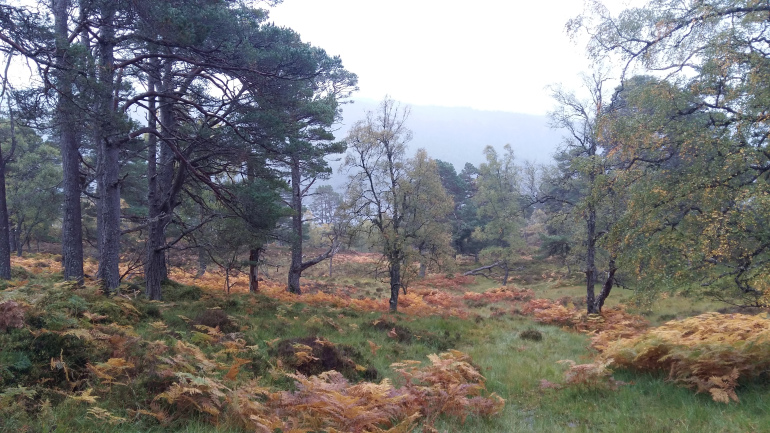Peace through Purpose: A week with Scottish rewilding charity, Trees for Life

Camilla Allen
In late September I was standing at Inverness station two hours before I was meant to be there. A pause which afforded a moment of reflection on the rush of the preceding week: writing, starting teaching, going to talks, delivering a lecture… It had been busy, and suddenly I was on the cusp of something different and unknown: a week volunteering for Trees for Life in the Highlands of Scotland, working to restore the Caledonian Forest. But was a week in the wilds really a good idea, considering that I am aiming to have my thesis written by Christmas and done and dusted early next year, ready for submission? One might think that it all was a bit of a distraction from the major task at hand… that it might even *gasp* be considered a holiday.
My thesis is on the forester and environmentalist Richard St. Barbe Baker, founder of the Men of the Trees and visionary behind the Green Front and Great Green Wall. Whilst the Cold War escalated, he imagined a world where the armies of the world would put down their weapons and join together to fight the growing deserts; reclaiming land for food production so that people would have enough to eat. It was a utopian idea which I first encountered whilst writing about Baker for my MA – brought to life in a children’s book, Kamiti, which seemed both laudable in its ambitions, but woefully optimistic; a beautiful dream which was unlikely to become a reality.
Now, four years after finishing that first essay, I have been immersed in the world Baker grew up in, and the narrative he created for himself as ‘The Man of the Trees’. It has required for me to maintain a distance from my subject – my role being to challenge, contextualise, and critique – so I can present a counterpoint to his well-honed biography. And that hasn’t proved to be a problem, but it felt that something was missing: that my research would make that more sense if I actively participated, rather than just watching from the sidelines (or, to be more accurate, keeping my head resolutely buried in a pile of books in the British Library).
On Saturday 29th September, I got in a bus with eight other volunteers and two group leaders to spend a week in a remote glen with intermittent electricity, no running water, a list of things for us to get done, and a whole lot of group dynamics to navigate. From the minute we set off, it was clear that we were in good hands; the aims and objectives of Trees for Life as a charity were clearly spelt out, the routine and responsibilities of cohabiting with strangers was deftly managed and we settled into life in the bothy quickly and easily. Describing it as transactional gives the wrong impression – but it was clear that the organisation knows that they are creating more than just an opportunity for people to plant a few trees and tick something off a bucket list…
The significance of being there was humbling. Trees for Life provides a place for people to learn, to explore, to challenge themselves, to grieve, to change. I didn’t know at first exactly why I was there, but it soon became clear that it was so I could connect to the real energy and impetus behind my thesis: that through planting and protecting trees we can change the world for the better, and possibly ourselves to boot.
Time had felt so rushed before, and suddenly I was feeling a calm and quiet which is absent in much of my life. The day was simple: wake, eat porridge, make a sandwich, get wet weather gear on (as well as a safety whistle and high-vis) and head to the hills for tree planting, ecological surveying or fence removal.
On the day that we removed tens of metres of deer fencing that had protected a re-establishing forest, I had a big grin slapped across my face for most of it. Writing and researching is a solitary business, and the contrast of hauling big bales of wire and fence posts around on a steep and slippery (and beautiful) slope was exhilarating. The moments of stillness that were also afforded were important too: a daily ‘sit spot’ where the group found an isolated place to sit, look and listen; looking up from planting tiny tree-lings to see a line of geese flying through the Glen; eagles crossing the sky; otter patrols as dawn broke.
The prospect of finishing my thesis is daunting sometimes; there is a lot of hard graft between me and a stack of crisp A4. But now the world beyond is looking all the more inviting. I am not sure where this research will take me, but it is fair to say that I am looking forward to putting some of this energy and enthusiasm into something practical and tangible as well as connecting it to the academic realm I have been inhabiting for the last six years. That is what has inspired and sustained me since I moved to Sheffield and studied landscape architecture: that I was on the way to finding something which had eluded me up until that point, and I think it has been found.
At the end of the week, everyone contributed a line for a collaborative poem. I had ‘peace through purpose’ brandished in my mind all week. I love the duality of the word: both a state of tranquillity and the absence of conflict; micro and macro. Baker’s dream is that of the macro – the world made safe through tree planting, and it just so happens that the macro version of peace might bring great respite to those doing the digging.
@CamillaAllen